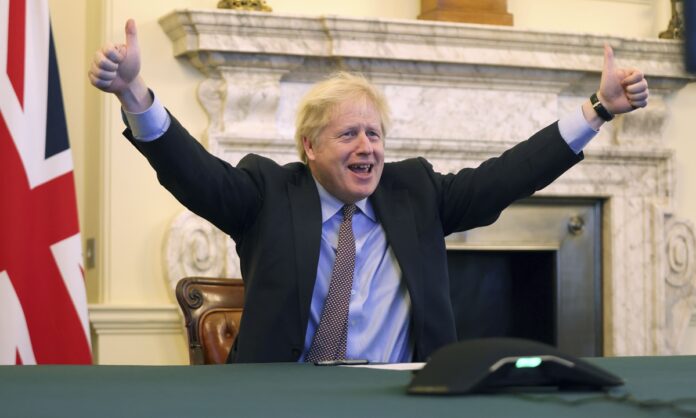By Jeph Ajobaju, Chief Copy Editor
When Boris Johnson announced his Brexit trade deal on December 24 last year, he enthused it would enable firms in the United Kingdom “to do even more business” with the European Union (EU).
Britain would be “prosperous and dynamic and contented” after completing its exit from the EU, Johnson declared, free to strike trade deals around the world while continuing to export seamlessly to the EU market of 450 million consumers.
Six months after Brexit, he is still searching for a major trade deal.
Johnson announced on June 15 a bilateral trade deal with Australia. It is the first of its kind since the UK left the EU on January 1 after a transition period that lasted a year.
There is little in the agreement for the UK, however, which has prompted its farmers to kick against the deal in fear of being priced out by cheap agricultural imports.
And the United States and India, allies with which Johnson had hoped to sign quick trade agreements, are occupied by domestic priorities likely to linger for months.
British business lamented in April that Brexit had depressed exports to the EU to 41 per cent, falling further from 40.7 per cent in January when imports from the UK’s biggest trading partner tumbled 28.8 per cent.
Now, per CNN reporting, the UK has begun talks on joining a Pacific trade partnership that it sees as one of its biggest opportunities to forge economic alliances beyond the EU after Brexit.
Economic windfall through CTPP
The UK Department for International Trade says membership in the Comprehensive and Progressive Agreement for Trans-Pacific Partnership (CPTPP) would produce an economic windfall by lowering tariffs on “key British exports” such as cars and whisky, while helping farmers to sell more meat to “fast growing” markets such as Mexico.
It could also boost trade in services and make it easier for tech firms to expand abroad.
The CPTPP is an 11-country free trade pact that came into force in December 2018 and includes Mexico, Australia, Canada and Singapore. It succeeded the Trans-Pacific Partnership after the United States withdrew under Donald Trump in 2017.
The agreement cuts tariffs among participants, standardizes regulations in areas such as food safety and determines levels of market access for goods and services, such as visa rules for business travelers, which can vary between members.
“Joining CPTPP would hitch Britain to some of the world’s biggest current and future economies, populated by half a billion people and with a joint GDP of £9 trillion ($12.5 trillion) in 2019,” the trade department said in a statement.
“It is a glittering post-Brexit prize that I want us to seize,” added Trade Secretary Liz Truss.
But trade experts tell CNN that joining the CPTPP will yield only very modest economic benefits, and won’t make up for the hit to Britain’s trade caused by exiting the EU.
Benefit won’t compensate for EU loss
They point to the challenges of doing business with countries that are many thousands of miles away.
The UK also already has bilateral trade deals in place with seven of the 11 CPTPP members – a number that would rise to eight if an agreement in principle with Australia, announced on June 15, is included.
That raises questions as to how much additional benefit membership will deliver.
“The biggest issue with the CPTPP is that it assists particularly those companies with trans-Pacific supply chains,” David Henig, the UK director at the European Centre For International Political Economy said on Twitter.
“The UK is mostly involved in European supply chains. And that’s why the economic impact is trivial. It could even be negative.”
By the UK government’s own estimate, membership could lift annual GDP by just 0.08 per cent – or £1.8 billion ($2.5 billion) – in the long run.
That compares to a 4 per cent loss of output from leaving the EU, based on previous modeling by the government’s economic forecasting agency.
Membership of CPTPP “will not in any way replace trade with the EU or balance out the effects of leaving it,” Anna Jerzewska, the founder of international trade consultancy Trade & Borders said on Twitter.
The Institute for Government, a British think tank, echoed these sentiments. “While [the economic] benefits are not negligible, they are unlikely in any significant way to make up for the economic losses arising from the UK leaving the EU,” it said in an explainer on its website.
The UK exported £294 billion ($408.7 billion) of goods and services to other EU member states in 2019, equivalent to 43 per cent of all UK exports, according to the Office for National Statistics (ONS).
But between January and March, ONS data shows that UK goods exports to the bloc tumbled 18 per cent to £32.2 billion ($44.8 billion) compared to the final three months of 2020, as businesses grappled with new trading rules.
By comparison, exports to CPTPP countries are set to increase by £37 billion ($51.4 billion) to £94 billion ($130.7 billion) by 2030, according to UK government forecasts.
Barriers to UK trade with CPTPP
“Joining would boost this growth and support British jobs,” the government said, adding in a strategy document that it “puts Britain at the heart of a dynamic group of countries.”
But Jerzewska cautioned that the UK will be “coming in from the outside,” hoping to integrate into supply chains that were established over decades. “It’s going to be quite a challenge,” she told CNN Business.
While membership could reduce tariffs on goods, it doesn’t get rid of other barriers to trade such as red tape and regulations, she added. In this sense, it is similar to the agreement that post-Brexit Britain has with the EU.
However, an agreement with the CPTPP could reassure Britain’s existing trade partners that it still favors trade liberalization, Jerzewska added.
“Brexit was a signal that the UK is becoming a bit more protectionist, so this is a way to show everyone we are serious about free trade.
“The geopolitical objectives are not to be ignored and a small positive impact on GDP is still a positive impact on GDP, but something tells me we’re about to hear a lot of inflated numbers and exaggerated claims about this deal.”













